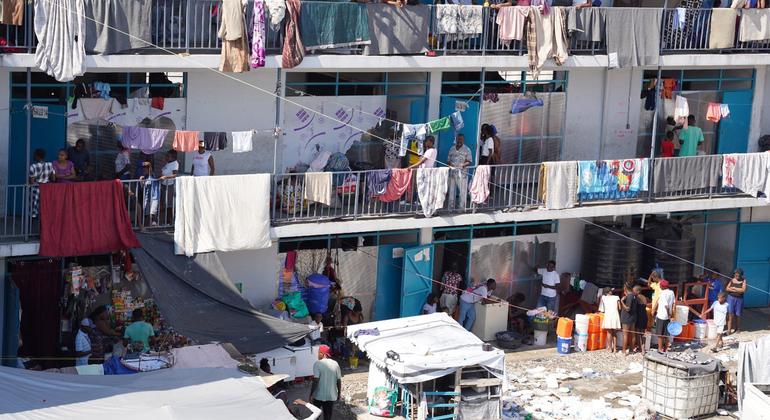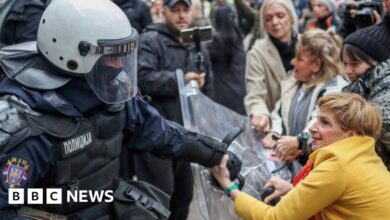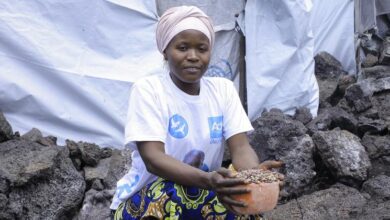World News Summary: Half of displaced people in Haiti are children, alarm over low vaccination rates, aid to East Africa


New data from the International Organization for Migration shows the number of people displaced has increased by 22% since June.
IOM said gang violence had forced more than 110,000 people from their homes in the past seven months, especially in Gressier, located west of the capital.
Grégoire Goodstein, IOM director in Haiti, said that the sharp increase in the number of displaced people underscores the urgent need for a sustained humanitarian response from the international community.
Moved many times
The UN agency noted that although more than 65,000 people have returned to the Cité Soleil neighborhood near the capital, known for deadly clashes between rival gangs, these returnees “often had to relocate again after new attacks.
As humanitarian needs have increased, IOM has continued to provide critical assistance to displaced people and host communities, although access for aid groups remains difficult and dangerous in many places.
IOM reaffirms that it will continue to work with the Government of Haiti and international partners to provide lifesaving assistance and find lasting solutions for those displaced.
The agency said it is important that efforts to restore stability and security across the country continue, alongside humanitarian aid to alleviate immediate suffering.
Global vaccination rates remain below pre-pandemic levels
Global vaccination rates remain below pre-pandemic levels and the number of children who have not received a single vaccine has increased to 14.5 million.
That’s one disturbing finding health advisory group meeting at the United Nations World Health Organization (WHO), which states that more than half of these so-called “zero dose” children live in 31 mostly developing countries.
According to the Strategic Advisory Group on Immunization (SAGE), many of these countries are fragile and affected by conflict. The group blames a lack of political will and reduced investment in vaccination programs for the lack of success in reaching vulnerable youth.
New advice
The expert group also provided advice on new vaccines for low- and middle-income countries where the burden of pediatric respiratory syncytial virus is high.
This is a common virus that affects the nose, throat and lungs and is a leading cause of hospitalization in children and the elderly.
Dr Hanna Nohynek, President of SAGE said: “It is clear that there is a large benefit to be expected and we have therefore made the recommendation that all countries should have maternal vaccination or monoclonal antibodies to protect children.”
She added that respiratory syncytial virus has increased since then COVID-19 and currently accounts for about one-third of people hospitalized for lower respiratory tract infections globally.
“Nearly all deaths from the virus have occurred in low- and middle-income countries,” she confirmed.
Nearly 70 million people across East Africa need humanitarian aid
New estimates from humanitarian organizations in East Africa show that nearly 67 million people in the region are currently in need of assistance.
“This number represents more than 20% of the total number of people in need globally,” said UN spokesman Stéphane Dujarric.
He added that the region is facing some of the world’s biggest humanitarian crises, driven by climate change, conflict, political instability, economic shocks and disease outbreaks.
Marburg virus spreads
Measles and Mpox outbreaks continue with at least 776 Mpox cases reported in the region as of September 26.
“The Marburg virus is currently spreading. Mr. Dujarric said at least 29 cases have been confirmed in Rwanda, including nine deaths.
Most cases to date have been among healthcare workers. The Africa Centers for Disease Control and Prevention said just under 300 contacts have been registered and are being monitored.
Marburg virus disease (MVD) is a severe and often fatal hemorrhagic disease caused by a virus that is commonly transmitted to humans from fruit bats.
Person-to-person transmission occurs through direct contact with the body fluids of an infected person or with equipment and materials contaminated with infectious blood or tissue. There is currently no vaccine or specific treatment for MVD.
Mr. Dujarric said the United Nations’ humanitarian partners continue to provide support to millions of people across East Africa.
“However, by the end of last month, only 38% of the $9.3 billion needed for humanitarian response efforts in East Africa this year was available, limiting our ability to scale up and our partner.”




